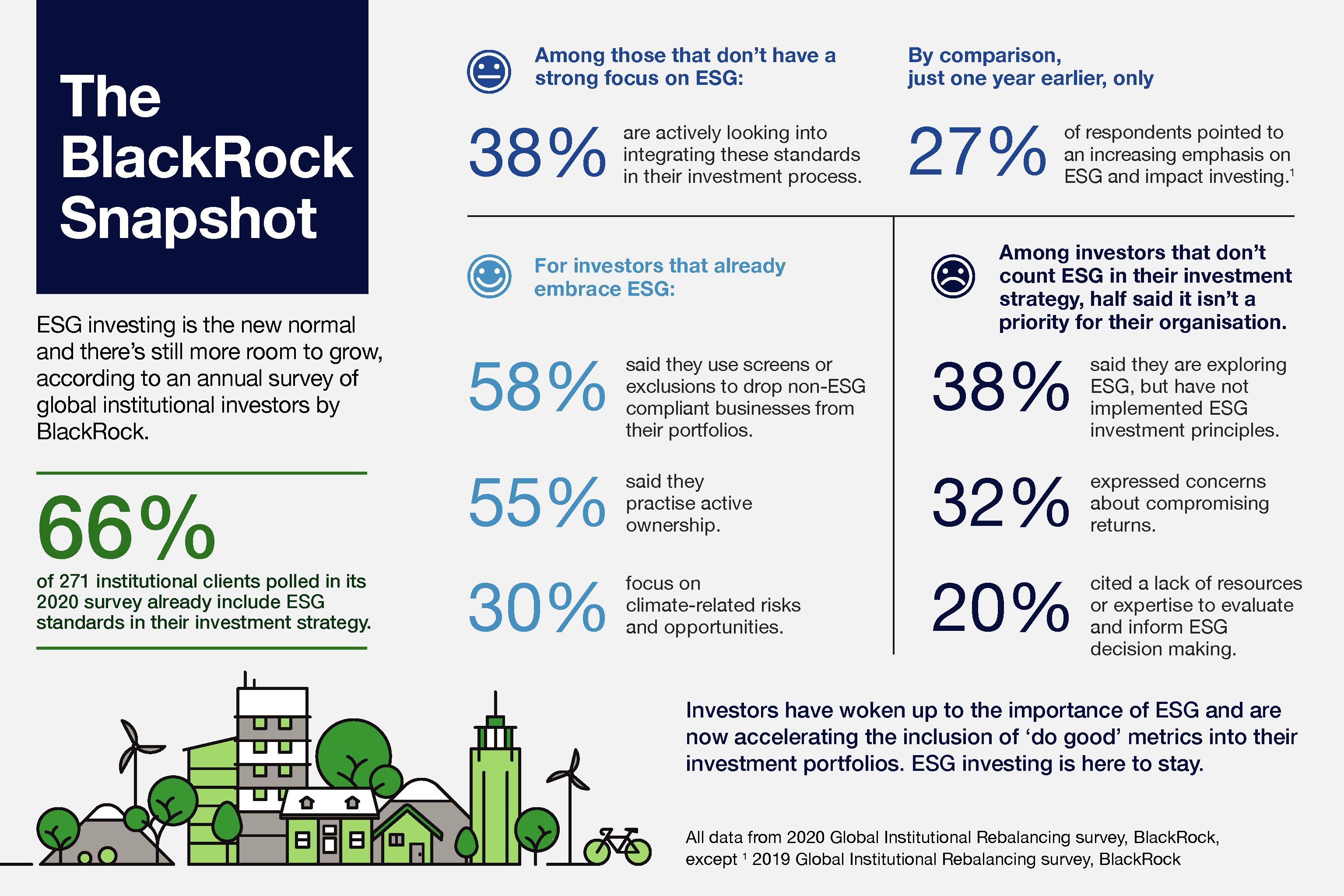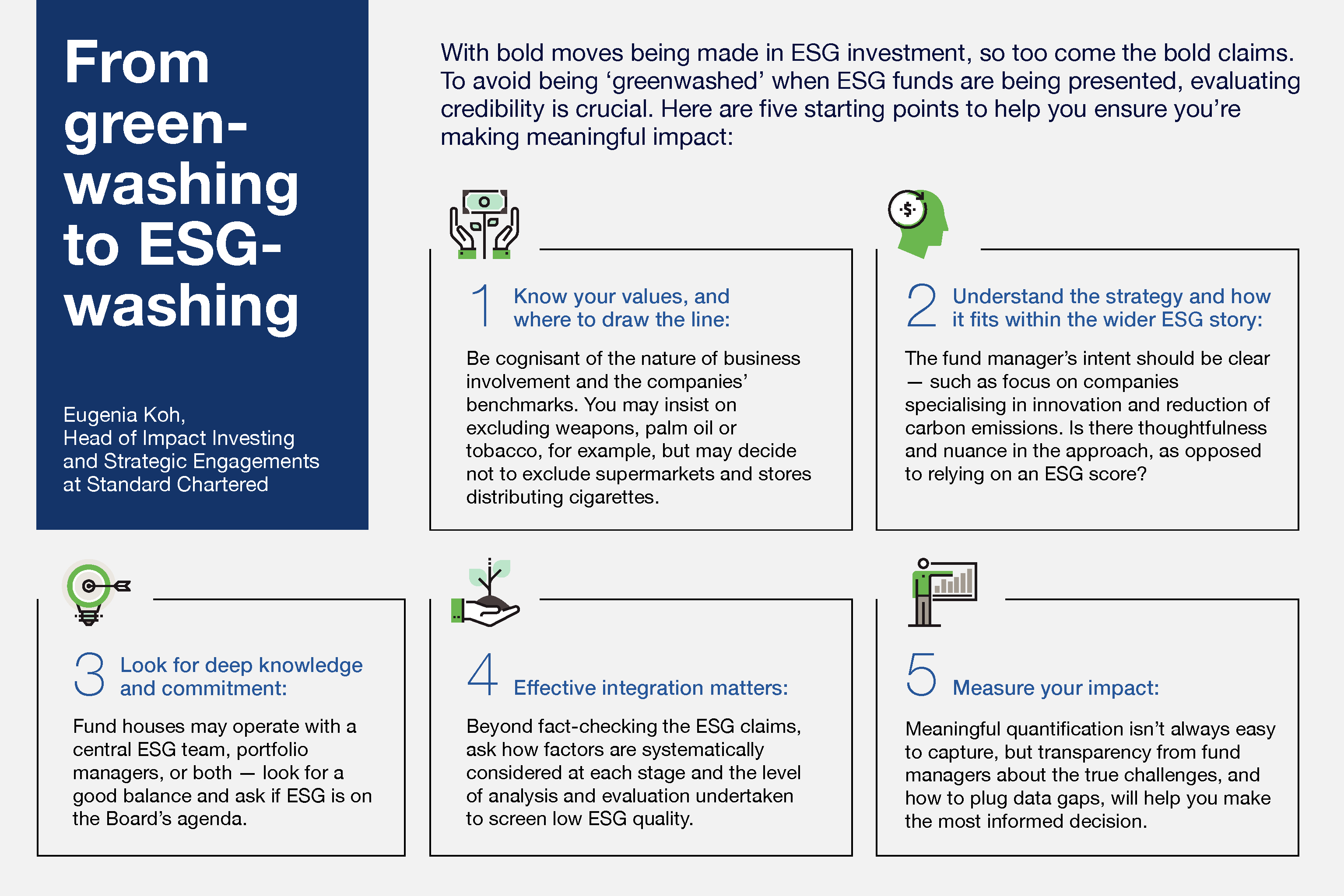Why ESG is the new normal


During the COVID-19 market downturn, Environmental, Social and Governance (ESG) stocks have continued to outperform the S&P 500 and MSCI Europe indices1. This trend which demonstrates an increasing investor preference for companies that take a stakeholder view of their business as opposed to a purely shareholder view could change the nature of corporate social responsibility.
Crisis brings people together and those companies that have been helping their employees, their customers and their communities have started appealing more to investors. For the same reasons, as economies begin to come out of lockdown, companies that have looked beyond their traditional narrow focus of growth to take care of broader stakeholder interests are expected to emerge in a stronger position. Companies are also realising that even in the post-pandemic world, they will need to do more to fully demonstrate how they are serving the wider interests of society. These developments are making ESG the new normal in investing and more and more asset owners are demanding sustainable investing strategies from their asset managers.
“Switched-on asset owners are aware that ESG investing can benefit risks and returns, but they also have their eye on the non-financial results. They want to know that their investments are helping to make the world a better place,” said Alexis Calla, Global Head, Investment Strategy and Advisory at Standard Chartered.
For environmental, social and governance (ESG) issues, “it is a watershed moment,” shared Paras Anand, chief investment officer for Asia-Pacific at Fidelity International. “What becomes extremely visible at a time like this is how companies are thinking about their broader stakeholders and issues related to sustainability. Even how companies think about their balance sheets, the way that brands resonate and connect with their customers become even more acute at a time like this.”
With regard to COVID recovery, central banks and governments have stepped in and are likely to be playing a much bigger role in the coming years. “This is an opportunity for regulators to shape the kinds of society that we want to live in once we come out of this,” suggested Jenn-Hui Tan, Fidelity’s Global Head of Stewardship and Sustainable Investing. “There is a rethink about what are the sorts of business models that we want to be supportive of? What are the sorts of priorities we want to have as a society? You can see regulators thinking about that now with the kind of dramatic policy actions taken through this crisis that has and will embolden them.”
Anand sees a new generation of companies that are able to partner effectively with governments and support quality with scale service provision the likes of which have not been seen before. “The next generation [of companies] will need to be delivering value in a totally different way.”
Even after the COVID threat is over, the message is clear – it is no longer optional for companies to apply ESG criteria to their operations and governance. Asset managers and institutional investors now recognise that there is a positive relationship between ESG investing and performance.
“There is a growing momentum behind the scenes that it’s not just good enough to make money. You shouldn’t have a negative impact on the communities and countries that you operate in, and should be increasingly focused on how you can do good by doing well,” said Daniel Hanna, Global Head of Sustainable Finance for Standard Chartered.
The need to be profitable as well as responsible is supported by a 2018 survey released by the Global Sustainable Investment Alliance2, which pegged socially-responsible investments in the world’s five major markets at USD30.7 trillion, up 34 per cent in two years.
Undoubtedly, offering ESG investments is not merely for PR purposes; it’s been proven to make sound business sense. Take the performance of the STOXX Global Climate Change Leaders Index3, for example, which tracks the CDP A List of companies leading the way on environmental transparency and performance. The index outperformed the STOXX global benchmark by 5.5 per cent a year over a seven-year period from December 2011 to January 2019.
ESG investments have even in cases proven more resilient in times of market shocks. According to February 2020 data compiled by the Financial Times, ESG investments showed greater resilience when stock markets began to crash. While the full impact of COVID-19’s spread has likely yet to be seen, the slower retreat from ESG compared to standard funds could indicate just how embed such investment principles have become in this day and age.

“Companies that have good sustainable business practices are going to outperform in the long run; they are going to generate sustainable profits by looking after their employees, the environment, and the supply chain,” said Fidelity’s Tan.
Hanna agrees, “This is pretty much common sense. Companies that have good environmental, social and governance awareness and tracking will tend to be companies that are very well run.”
There are, of course, risks involved in all investments. Financial risks need to be taken into account along with the impact of climate change where asset values are vulnerable to both physical and transition risks.4
Physical risks can hurt credit portfolios or drive down the value of assets. These risks can be incurred via direct exposure to entities and countries that experience extreme weather events, or indirectly, by the effects of climate change. A prime example is California’s largest utility company, which became the first corporate to have its bankruptcy linked to climate change.
Transition risks arise from the adjustment to a low-carbon economy5 that may entail policy and legal changes, or market and technological shifts.
There is also the reputational risk fallout to be reckoned with from investments that are not seen as environmentally responsible. The past decade has seen widely reported examples of reputational backlash in both the automotive and oil and gas sectors.
Incorporating climate risk in investment strategies could hedge against collateral damage in portfolio holdings,6 especially assets in infrastructure, real estate and agriculture, which are highly sensitive to extreme weather.
Naturally, all investments carry risks but it’s not just about what’s in immediate view. As Standard Chartered’s Calla added, “Investors are increasingly looking at the longer-term forces such as climate risk and sustainable development and their impact on future investment returns.”
Institutional investors, such as pension funds,7 are also increasingly factoring in climate change as they seek to pursue investment strategies that will act in the best long-term interests of fund members. One leader in this space is Japan’s Government Investment Fund (GPIF), the world’s biggest retirement scheme, which emphasises ESG factors8 in its investment processes. GPIF requires asset managers to integrate ESG into both their investment analysis and decision-making, and regards buying green, social and sustainable bonds as a direct method of ESG integration in fixed-income investments.9
As Fidelity’s Tan suggested, “Active management in the future is going to be judged not just on the financial performance the funds deliver but also on the non-financial contributions we’re making to the companies that we invest in.”
A compelling signal that climate change is transforming finance was sent out by BlackRock, the world’s largest asset management firm, when earlier this year it announced its conclusion that climate risk is an investment risk, and it would therefore place sustainability at the centre of its business.

In his 2020 annual letter to company executives, BlackRock CEO Larry Fink said that climate change has brought us to “the edge of a fundamental reshaping of finance” and will require “a significant reallocation of capital” in the near future. Fink called attention to the importance of investment stewardship, commenting that BlackRock stewardship teams would continue to engage with the issue and be “increasingly disposed to vote against management and board directors when companies are not making sufficient progress on sustainability-related disclosures and the business practices and plans underlying them.”
It also committed to making sustainable investing more transparent and accessible by providing investors with more ESG product offerings and investment options, as well as encouraging companies to increase and improve relevant climate related disclosures.10
As Standard Chartered’s Hanna explained, “Once you’ve developed a negative ESG screen, you have to start thinking about how your portfolios should have a positive impact. Not just to do no harm, but to potentially do some good.”
It has taken a spate of intense climate-related risks, and increased pressure from investors and shareholders, to rouse the financial sector at large and the world’s economic leaders from inaction on climate change.
Fidelity’s Tan urged people to take collective action, “More needs to be done by all participants because this is not a problem that anyone can individually solve. The contamination of the biosphere is a global problem; it’s not a national problem. I think all of us need to do more.”
Time will tell whether investors will continue to remain wedded to a view that sustainable or ESG investing, is about ‘values’ rather than ‘value’, once the COVID-19 threat has passed. Or whether they will seek sustainable outcomes alongside their traditional financial objectives. But the role of ESG in building business resilience has never been more obvious than it is now.
2 http://www.gsi-alliance.org/wp-content/uploads/2019/06/GSIR_Review2018F.pdf
7 https://hbr.org/2019/05/the-investor-revolution
9 https://www.gpif.go.jp/en/investment/esg/idb.html
10 https://www.blackrock.com/sg/en/terms-and-conditions?targetUrl=%2Fsg%2Fen%2Fblackrock-client-letter
Sustainable Finance | Financial Institutions | Africa | Americas | Asia | Europe | Middle East | Articles